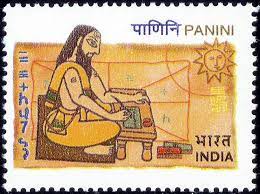Panini (between the 4th – 6th centuries BCE) was a Sanskrit grammarian and linguist who gave a comprehensive and scientific theory of philology, phonetics, phonology, and morphology. He is also considered the first descriptive linguist of the world.
Panini is believed to had born in Shalatula, a town near modern Attock on the Indus River in present-day Pakistan.
Sanskrit was the classical literary language of ancient India and Panini is considered the founder of the language and literature. It is interesting to note that the word “Sanskrit” means “complete” or “perfect” and it was considered as the divine language or language of the gods. Most of the ancient Indian literature (sacred texts of Hindus) are in Sanskrit only.
His major work is a treatise called Astadhyayi (or Astaka ), consisting of eight chapters, each subdivided into quarter sub-chapters. In this work, Panini distinguishes between the language of sacred texts and the usual language of routine communication. Panini gives formal production rules for the sentences and definitions to describe Sanskrit grammar. Starting with about 1700 basic elements like nouns, verbs, vowels, consonants he put them into classes. The construction of sentences, compound nouns etc. is explained as ordered rules operating on underlying structures in a manner similar to modern theory.
